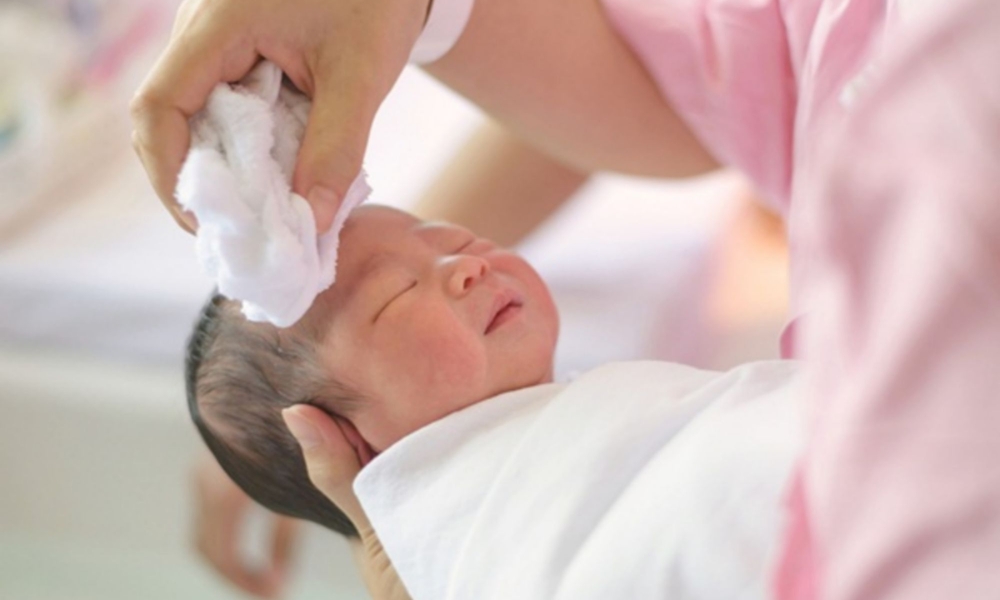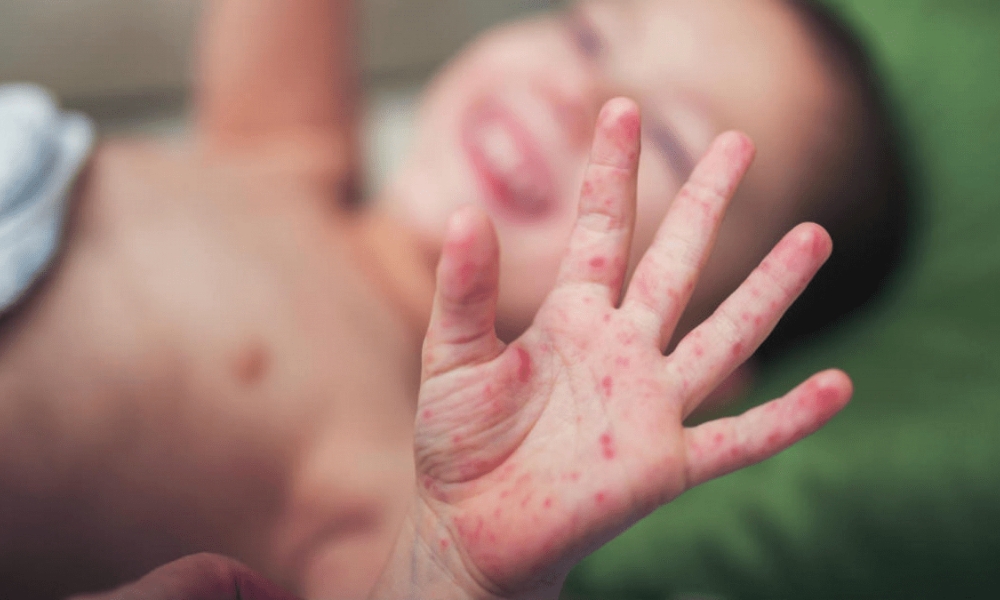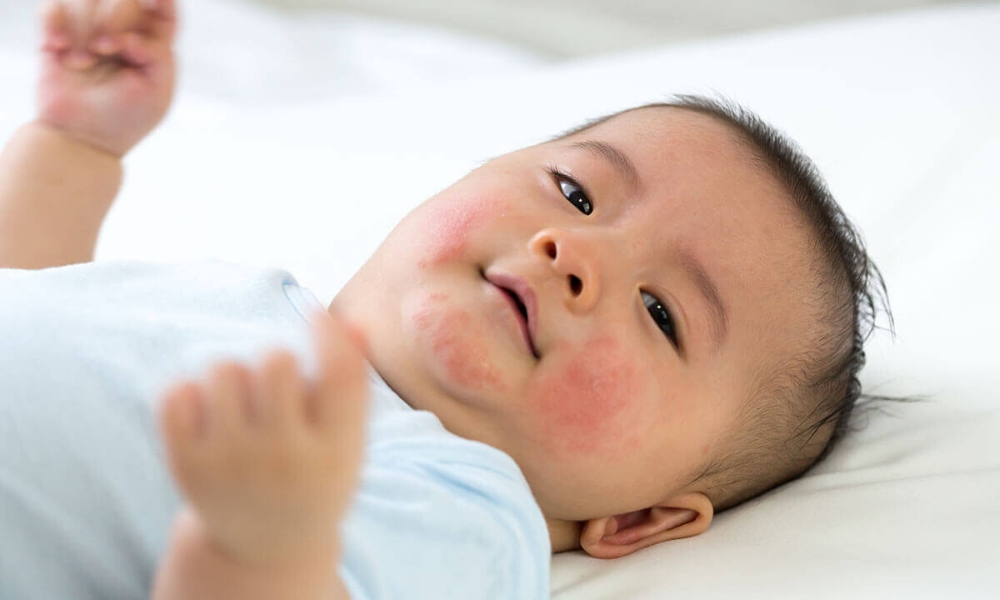Understanding Skin Infections in Newborns: Symptoms, Causes, and Prevention
Skin infections in newborns are a common health concern that many parents face. With their delicate and sensitive skin, infants can easily suffer from infections caused by environmental factors such as bacteria, viruses, or fungi. Recognizing the early signs of infection is crucial for effective treatment and ensuring the well-being of your child. In this guide, we’ll explore what skin infections are, their causes, symptoms, and preventative measures you can take.
What Is a Skin Infection in Newborns?
A skin infection or dermatosis in newborns is a reaction of the skin to external agents. These infections are often linked to the child’s allergic constitution. Most cases can resolve with proper care and treatment. However, improper handling can worsen the condition and lead to severe complications.

Common skin infections in newborns can include various symptoms (Image Source: Tiki.vn)
Causes of Skin Infections in Newborns
The causes of skin infections in infants can vary widely, and include:
-
Weather Conditions: Unstable weather can cause excessive sweating and oil production, creating an ideal environment for bacteria and fungi to thrive. Regular bathing is essential to maintain cleanliness and prevent infections.
-
Microorganisms: The surrounding environment is rich in bacteria, viruses, fungi, and parasites that can cause skin infections. Newborns’ skin is particularly vulnerable as it has yet to adapt to external conditions.
-
Chemical Allergies: Infants’ skin can react to chemicals found in soaps, detergents, or fabric softeners, resulting in allergic reactions that can lead to infections.
-
Contact with Poor-quality Products: Low-quality diapers and clothing materials can also be common culprits for skin infections.
-
Insect Bites: Sensitive skin can become infected if the baby suffers from insect bites.
- Untreated Diaper Rash: Frequent exposure to sweat and waste can lead to severe infections if diaper rashes are not treated promptly.
Common Types of Skin Infections
Recognizing the specific types of skin infections commonly seen in newborns is essential. These include:
-
Pustular Skin Infections: Often more prevalent during hot weather, these conditions are characterized by pustules that can develop on the skin.
-
Allergic Dermatitis: This non-contagious condition typically affects children under 5 and can present with varying levels of itchiness and skin dryness.
-
Seborrheic Dermatitis: Commonly known as cradle cap, it occurs due to hormone transmission from the mother and can lead to skin lesions and hair loss.
-
Eczematous Dermatitis: Often related to genetic factors, this chronic condition can manifest in various locations and lead to significant discomfort.
- Facial Skin Infections: Bacterial, viral, or fungal invasions in this sensitive area can cause noticeable redness, itching, and pustules.

Skin infections can manifest in several ways (Image Source: Tiki.vn)
Symptoms of Skin Infections
Symptoms of skin infections in newborns can often be quite apparent:
- Redness and Swelling: Notable swelling and inflammation of the affected areas.
- Pustules or Blisters: Pus-filled lesions that can easily burst and form crusts.
- Itching and Discomfort: These symptoms can cause significant unease in infants.
Is Skin Infection Serious?
While prevalent, proper detection and timely treatment of skin infections can protect your newborn’s delicate skin from severe complications. If you notice any unusual changes in your child’s skin, such as irritations or persistent bumps, it’s vital to seek medical attention immediately to prevent worsening infection.
Preventative Tips for Skin Infections
Protecting your baby’s sensitive skin is crucial. Here are effective prevention tips:
- Keep Skin Dry: Moist skin can predispose your child to infections.
- Daily Hygiene: Bathe your baby with gentle, natural products to avoid irritation.
- Remove Sweaty Clothes: Wipe sweat off your baby to keep their skin breathable.
- Maintain a Clean Environment: Regularly clean and disinfect your baby’s surroundings to limit exposure to harmful microbes.
- Seek Regular Medical Checkups: Schedule periodic health check-ups to ensure all skin concerns are addressed promptly.

Regular hygiene is key to preventing infections (Image Source: Tiki.vn)
Lastly, timely consultation with healthcare professionals can ensure your infant’s skin health. For deeper insights into managing your infant’s health and other child-rearing topics, check out these articles:
- 1001 Vấn Đề Nuôi Dạy Con – Các Bệnh Thường Gặp Ở Trẻ | 1001 Issues in Child Rearing
- Nuôi Con Kiểu Nhật – Chăm Trẻ Ốm Ở Nhà | Japanese Parenting Style – Caring for Sick Children
- Men Vi Sinh Bifina Baby Nhật Bản | Bifina Baby Probiotics from Japan
- Chăm sóc da cho trẻ sơ sinh | Skin Care for Newborns
For more tips and relevant advice, always consider consulting professionals in child health to ensure the best for your little ones.
Leave a Reply
You must be logged in to post a comment.